Lecture 2 English classical economists Plan 1.



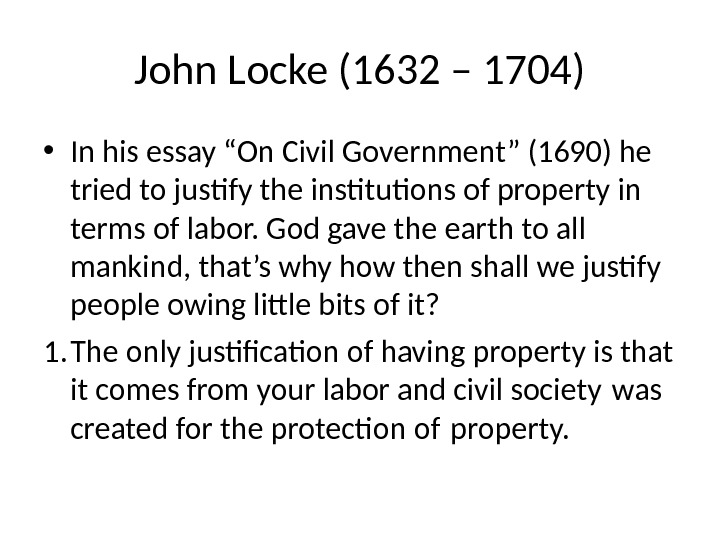



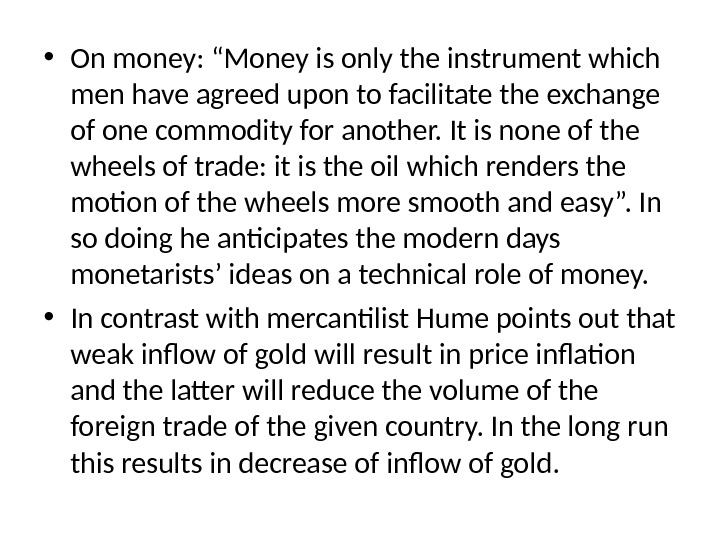
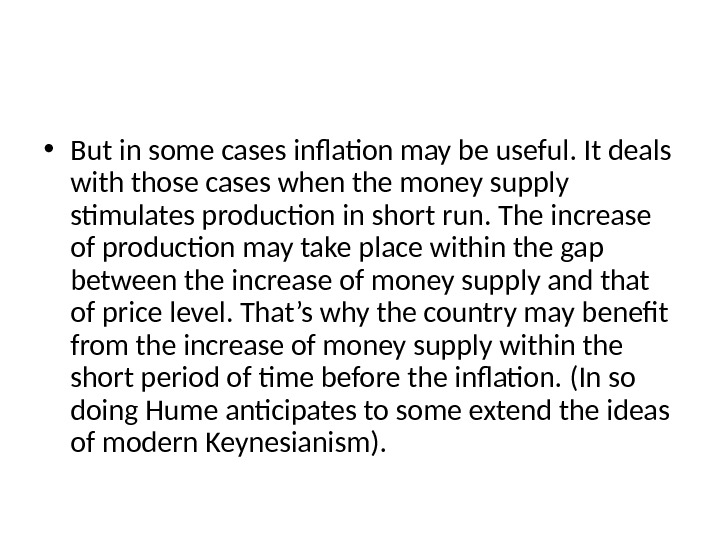


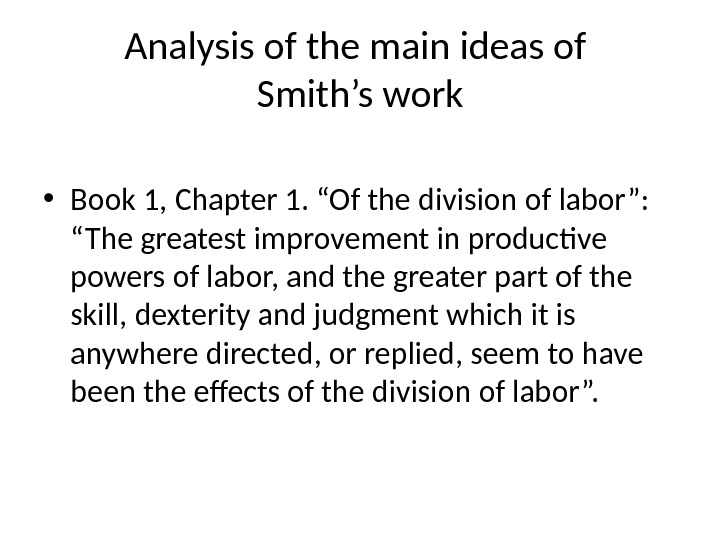
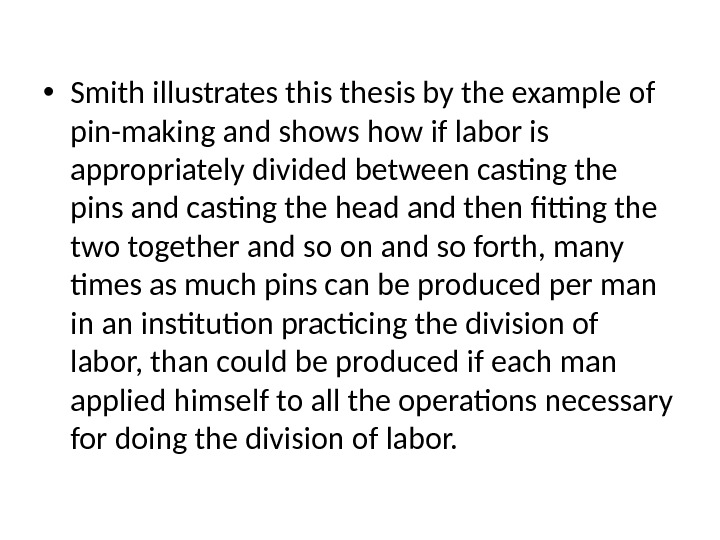

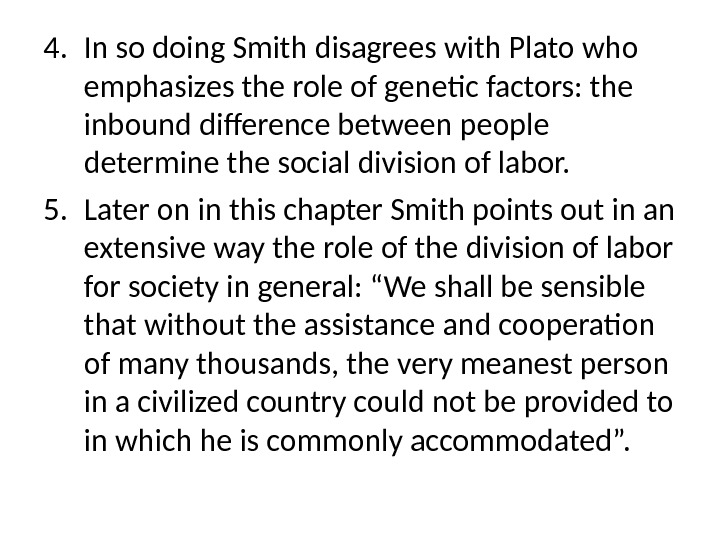
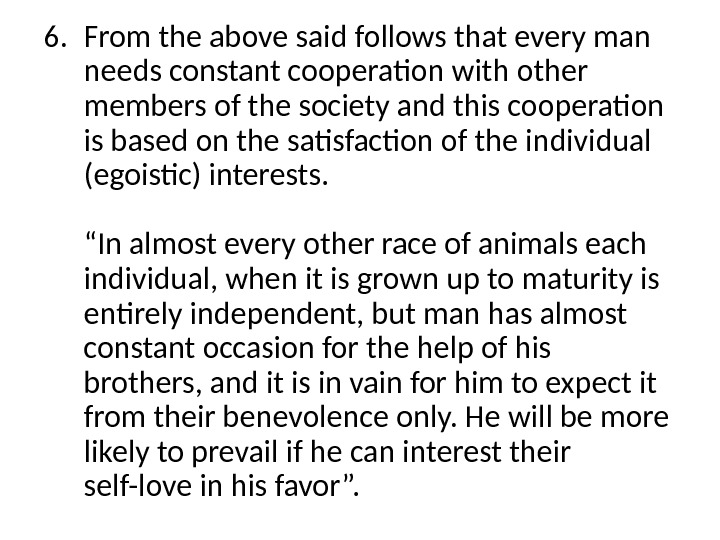

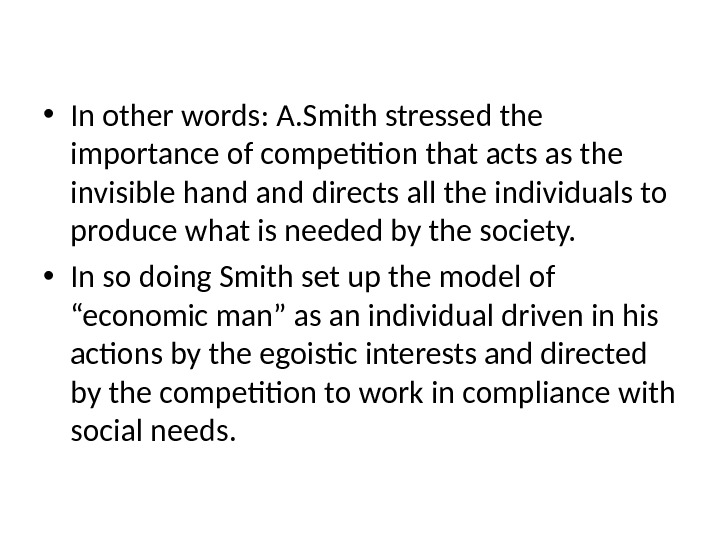

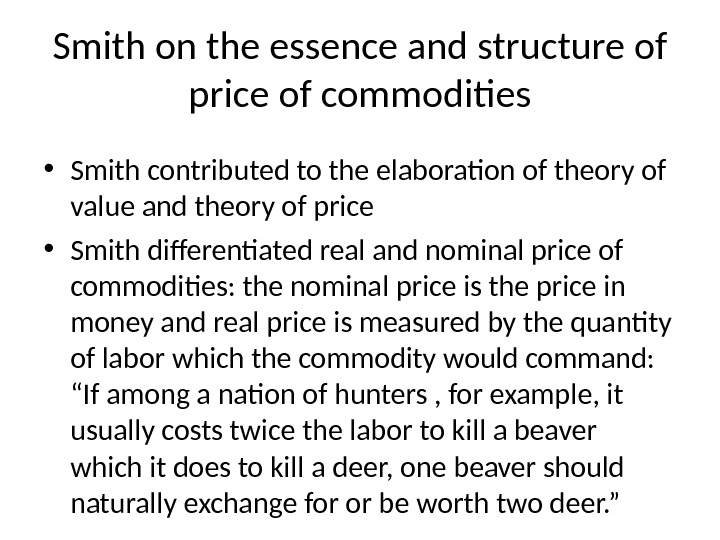
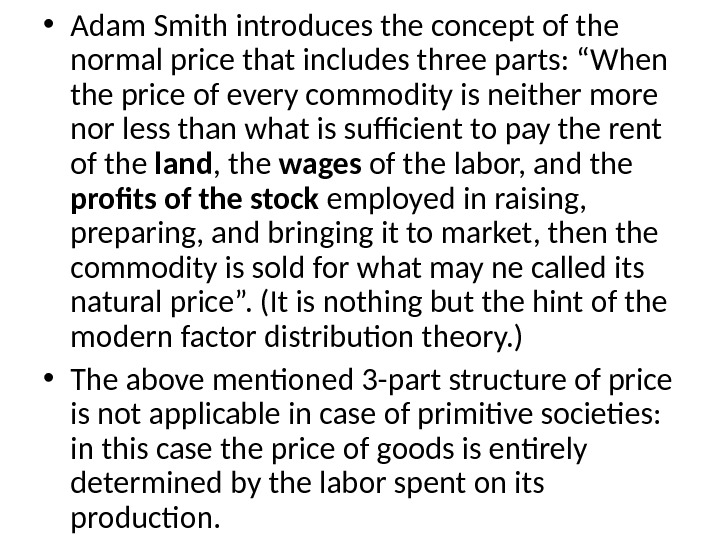

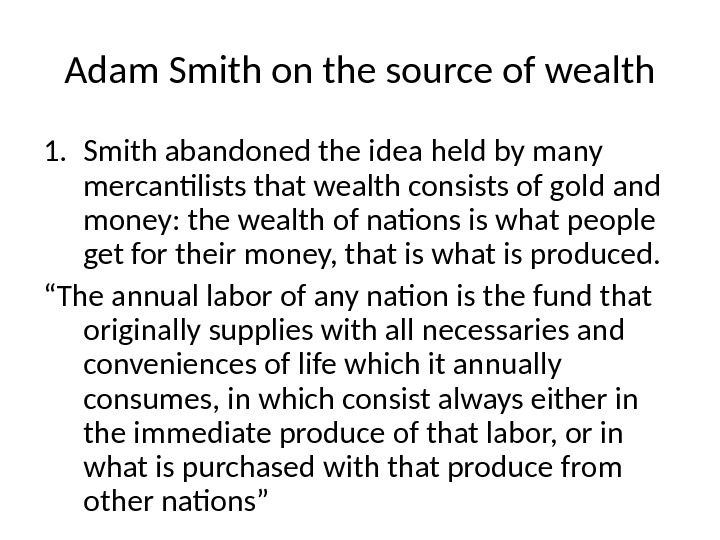
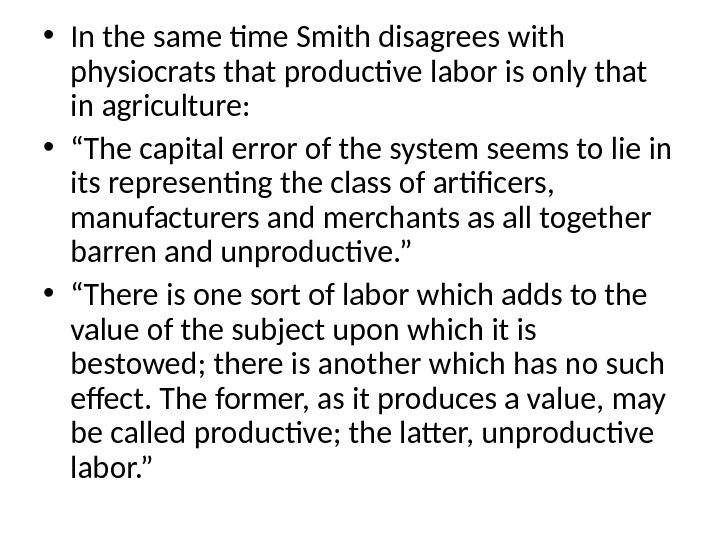
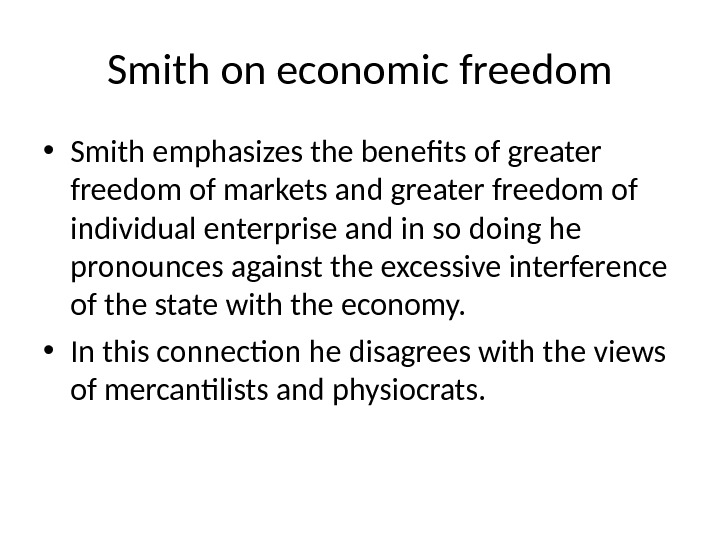


history_of_economic_thought._lecture_2.ppt
- Размер: 224 Кб
- Количество слайдов: 26
Описание презентации Lecture 2 English classical economists Plan 1. по слайдам
 Lecture 2 English classical economists
Lecture 2 English classical economists
 Plan 1. Locke and Hume on Property and Money 2. Adam Smith and his “An Inquiry into the Nature and Causes of the Wealth of Nations”
Plan 1. Locke and Hume on Property and Money 2. Adam Smith and his “An Inquiry into the Nature and Causes of the Wealth of Nations”
 John Locke (1632 – 1704) • In his essay “On Civil Government” (1690) he tried to justify the institutions of property in terms of labor. God gave the earth to all mankind, that’s why how then shall we justify people owing little bits of it? 1. The only justification of having property is that it comes from your labor and civil society was created for the protection of property.
John Locke (1632 – 1704) • In his essay “On Civil Government” (1690) he tried to justify the institutions of property in terms of labor. God gave the earth to all mankind, that’s why how then shall we justify people owing little bits of it? 1. The only justification of having property is that it comes from your labor and civil society was created for the protection of property.
 2. Locke on money: he says that money results from the common agreement and contract concluded by the people to use money. He points out that gold and silver are money because they do not deteriorate by keeping 3. Locke pronounces in favor of private property as the basis of personal liberty and independence. 4. Economic system can emerge in the absence of the state and in so doing property precedes the appearance of the government.
2. Locke on money: he says that money results from the common agreement and contract concluded by the people to use money. He points out that gold and silver are money because they do not deteriorate by keeping 3. Locke pronounces in favor of private property as the basis of personal liberty and independence. 4. Economic system can emerge in the absence of the state and in so doing property precedes the appearance of the government.
 David Hume (1711 -1776) • Major works: – essay “Concerning the Principles of Morals” (1751) – “ The Treatise on Human Nature” (1739 -1740) • His works dealt with the ideas of private property, inflation, foreign trade and social justice: he talks about justice in relation to property and contract.
David Hume (1711 -1776) • Major works: – essay “Concerning the Principles of Morals” (1751) – “ The Treatise on Human Nature” (1739 -1740) • His works dealt with the ideas of private property, inflation, foreign trade and social justice: he talks about justice in relation to property and contract.
 • Hume did note share Locke’s views on the natural character of private property. • The only justification of private property is the scarcity of the resources. • Property cannot be distributed in equal manner because it would undermine thrift in industry and impoverish the society. • Foreign trade stimulates country’s economic growth and but its role is not decisive.
• Hume did note share Locke’s views on the natural character of private property. • The only justification of private property is the scarcity of the resources. • Property cannot be distributed in equal manner because it would undermine thrift in industry and impoverish the society. • Foreign trade stimulates country’s economic growth and but its role is not decisive.
 • On money: “Money is only the instrument which men have agreed upon to facilitate the exchange of one commodity for another. It is none of the wheels of trade: it is the oil which renders the motion of the wheels more smooth and easy”. In so doing he anticipates the modern days monetarists’ ideas on a technical role of money. • In contrast with mercantilist Hume points out that weak inflow of gold will result in price inflation and the latter will reduce the volume of the foreign trade of the given country. In the long run this results in decrease of inflow of gold.
• On money: “Money is only the instrument which men have agreed upon to facilitate the exchange of one commodity for another. It is none of the wheels of trade: it is the oil which renders the motion of the wheels more smooth and easy”. In so doing he anticipates the modern days monetarists’ ideas on a technical role of money. • In contrast with mercantilist Hume points out that weak inflow of gold will result in price inflation and the latter will reduce the volume of the foreign trade of the given country. In the long run this results in decrease of inflow of gold.
 • But in some cases inflation may be useful. It deals with those cases when the money supply stimulates production in short run. The increase of production may take place within the gap between the increase of money supply and that of price level. That’s why the country may benefit from the increase of money supply within the short period of time before the inflation. (In so doing Hume anticipates to some extend the ideas of modern Keynesianism).
• But in some cases inflation may be useful. It deals with those cases when the money supply stimulates production in short run. The increase of production may take place within the gap between the increase of money supply and that of price level. That’s why the country may benefit from the increase of money supply within the short period of time before the inflation. (In so doing Hume anticipates to some extend the ideas of modern Keynesianism).
 Adam Smith and his “An Inquiry into the Nature and Causes of the Wealth of Nations” • Adam Smith (1732 – 1790), a great friend of David Hume and Francois Quesnay • Adam Smith gave economics its shape (his definition of subject, approach, order of the topics and system of analysis are shared by the modern economics). • His main work “The Wealth of Nations” was accomplished in 1776. The main content is theory of productive organization and a theory of the causes of the economic growth.
Adam Smith and his “An Inquiry into the Nature and Causes of the Wealth of Nations” • Adam Smith (1732 – 1790), a great friend of David Hume and Francois Quesnay • Adam Smith gave economics its shape (his definition of subject, approach, order of the topics and system of analysis are shared by the modern economics). • His main work “The Wealth of Nations” was accomplished in 1776. The main content is theory of productive organization and a theory of the causes of the economic growth.
 “ The Wealth of Nations” • The first part of the book lays down that growth depends on the division of labor and the division of labor is organized by the market and the force of what he called self-interest. • The second part of the book deals with the explanation of the positive impact of the possession of stock on the division of labor (accumulation of stock promotes the division of labor)
“ The Wealth of Nations” • The first part of the book lays down that growth depends on the division of labor and the division of labor is organized by the market and the force of what he called self-interest. • The second part of the book deals with the explanation of the positive impact of the possession of stock on the division of labor (accumulation of stock promotes the division of labor)
 Analysis of the main ideas of Smith’s work • Book 1, Chapter 1. “Of the division of labor”: “The greatest improvement in productive powers of labor, and the greater part of the skill, dexterity and judgment which it is anywhere directed, or replied, seem to have been the effects of the division of labor”.
Analysis of the main ideas of Smith’s work • Book 1, Chapter 1. “Of the division of labor”: “The greatest improvement in productive powers of labor, and the greater part of the skill, dexterity and judgment which it is anywhere directed, or replied, seem to have been the effects of the division of labor”.
 • Smith illustrates this thesis by the example of pin-making and shows how if labor is appropriately divided between casting the pins and casting the head and then fitting the two together and so on and so forth, many times as much pins can be produced per man institution practicing the division of labor, than could be produced if each man applied himself to all the operations necessary for doing the division of labor.
• Smith illustrates this thesis by the example of pin-making and shows how if labor is appropriately divided between casting the pins and casting the head and then fitting the two together and so on and so forth, many times as much pins can be produced per man institution practicing the division of labor, than could be produced if each man applied himself to all the operations necessary for doing the division of labor.
 • Summing up: The main causes of the increase of the quantity of work as the consequence of the division of labor are: 1. Increase of the dexterity in every particular workman. 2. Saving of time which is commonly lost in passing from one species of work to another 3. Invention of a great number of machine which facilitate and abridge labor, and enable one man to do the work of many.
• Summing up: The main causes of the increase of the quantity of work as the consequence of the division of labor are: 1. Increase of the dexterity in every particular workman. 2. Saving of time which is commonly lost in passing from one species of work to another 3. Invention of a great number of machine which facilitate and abridge labor, and enable one man to do the work of many.
 4. In so doing Smith disagrees with Plato who emphasizes the role of genetic factors: the inbound difference between people determine the social division of labor. 5. Later on in this chapter Smith points out in an extensive way the role of the division of labor for society in general: “We shall be sensible that without the assistance and cooperation of many thousands, the very meanest person in a civilized country could not be provided to in which he is commonly accommodated”.
4. In so doing Smith disagrees with Plato who emphasizes the role of genetic factors: the inbound difference between people determine the social division of labor. 5. Later on in this chapter Smith points out in an extensive way the role of the division of labor for society in general: “We shall be sensible that without the assistance and cooperation of many thousands, the very meanest person in a civilized country could not be provided to in which he is commonly accommodated”.
 6. From the above said follows that every man needs constant cooperation with other members of the society and this cooperation is based on the satisfaction of the individual (egoistic) interests. “In almost every other race of animals each individual, when it is grown up to maturity is entirely independent, but man has almost constant occasion for the help of his brothers, and it is in vain for him to expect it from their benevolence only. He will be more likely to prevail if he can interest their self-love in his favor”.
6. From the above said follows that every man needs constant cooperation with other members of the society and this cooperation is based on the satisfaction of the individual (egoistic) interests. “In almost every other race of animals each individual, when it is grown up to maturity is entirely independent, but man has almost constant occasion for the help of his brothers, and it is in vain for him to expect it from their benevolence only. He will be more likely to prevail if he can interest their self-love in his favor”.
 Adam Smith on “the invisible hand” as the mechanism of cooperation in the process of social division of labor • “ Whoever offers to another a bargain of any kind, proposes to do this. Give me that which I want , and you shall have this which you want, is the meaning of every such offer; and it is in this manner that we obtain from one another the far greater part of those good offices which we stand in need of. It not from the benevolence of the butcher, the brewer, or the baker, that we expect or dinner, but from their regard to their own interest. We address ourselves, not to their humanity but to their self-love, and never talk to them of our own necessities but of their advantages. ”
Adam Smith on “the invisible hand” as the mechanism of cooperation in the process of social division of labor • “ Whoever offers to another a bargain of any kind, proposes to do this. Give me that which I want , and you shall have this which you want, is the meaning of every such offer; and it is in this manner that we obtain from one another the far greater part of those good offices which we stand in need of. It not from the benevolence of the butcher, the brewer, or the baker, that we expect or dinner, but from their regard to their own interest. We address ourselves, not to their humanity but to their self-love, and never talk to them of our own necessities but of their advantages. ”
 • In other words: A. Smith stressed the importance of competition that acts as the invisible hand directs all the individuals to produce what is needed by the society. • In so doing Smith set up the model of “economic man” as an individual driven in his actions by the egoistic interests and directed by the competition to work in compliance with social needs.
• In other words: A. Smith stressed the importance of competition that acts as the invisible hand directs all the individuals to produce what is needed by the society. • In so doing Smith set up the model of “economic man” as an individual driven in his actions by the egoistic interests and directed by the competition to work in compliance with social needs.
 Smith on the division of labor • A. Smith: “The Division of Labour is Limited by the Extent of the Market” • The deeper the division of labor, the greater is the scale of exchange. But the deepening and development of division of labor is limited by extent of the market. • Nowadays this idea is developed further on by the discovery that disintegration of firms deepens the division of labour. (The most obvious example is illustrated by transnational companies. )
Smith on the division of labor • A. Smith: “The Division of Labour is Limited by the Extent of the Market” • The deeper the division of labor, the greater is the scale of exchange. But the deepening and development of division of labor is limited by extent of the market. • Nowadays this idea is developed further on by the discovery that disintegration of firms deepens the division of labour. (The most obvious example is illustrated by transnational companies. )
 Smith on the essence and structure of price of commodities • Smith contributed to the elaboration of theory of value and theory of price • Smith differentiated real and nominal price of commodities: the nominal price is the price in money and real price is measured by the quantity of labor which the commodity would command: “If among a nation of hunters , for example, it usually costs twice the labor to kill a beaver which it does to kill a deer, one beaver should naturally exchange for or be worth two deer. ”
Smith on the essence and structure of price of commodities • Smith contributed to the elaboration of theory of value and theory of price • Smith differentiated real and nominal price of commodities: the nominal price is the price in money and real price is measured by the quantity of labor which the commodity would command: “If among a nation of hunters , for example, it usually costs twice the labor to kill a beaver which it does to kill a deer, one beaver should naturally exchange for or be worth two deer. ”
 • Adam Smith introduces the concept of the normal price that includes three parts: “When the price of every commodity is neither more nor less than what is sufficient to pay the rent of the land , the wages of the labor, and the profits of the stock employed in raising, preparing, and bringing it to market, then the commodity is sold for what may ne called its natural price”. (It is nothing but the hint of the modern factor distribution theory. ) • The above mentioned 3 -part structure of price is not applicable in case of primitive societies: in this case the price of goods is entirely determined by the labor spent on its production.
• Adam Smith introduces the concept of the normal price that includes three parts: “When the price of every commodity is neither more nor less than what is sufficient to pay the rent of the land , the wages of the labor, and the profits of the stock employed in raising, preparing, and bringing it to market, then the commodity is sold for what may ne called its natural price”. (It is nothing but the hint of the modern factor distribution theory. ) • The above mentioned 3 -part structure of price is not applicable in case of primitive societies: in this case the price of goods is entirely determined by the labor spent on its production.
 • Should the market price be above or below the natural price, then fluctuations on demand supply will restore the competitive normal price. (In so doing Smith analyses causes of disbalances between demand supply and the consequence of them)
• Should the market price be above or below the natural price, then fluctuations on demand supply will restore the competitive normal price. (In so doing Smith analyses causes of disbalances between demand supply and the consequence of them)
 Adam Smith on the source of wealth 1. Smith abandoned the idea held by many mercantilists that wealth consists of gold and money: the wealth of nations is what people get for their money, that is what is produced. “ The annual labor of any nation is the fund that originally supplies with all necessaries and conveniences of life which it annually consumes, in which consist always either in the immediate produce of that labor, or in what is purchased with that produce from other nations”
Adam Smith on the source of wealth 1. Smith abandoned the idea held by many mercantilists that wealth consists of gold and money: the wealth of nations is what people get for their money, that is what is produced. “ The annual labor of any nation is the fund that originally supplies with all necessaries and conveniences of life which it annually consumes, in which consist always either in the immediate produce of that labor, or in what is purchased with that produce from other nations”
 • In the same time Smith disagrees with physiocrats that productive labor is only that in agriculture: • “ The capital error of the system seems to lie in its representing the class of artificers, manufacturers and merchants as all together barren and unproductive. ” • “ There is one sort of labor which adds to the value of the subject upon which it is bestowed; there is another which has no such effect. The former, as it produces a value, may be called productive; the latter, unproductive labor. ”
• In the same time Smith disagrees with physiocrats that productive labor is only that in agriculture: • “ The capital error of the system seems to lie in its representing the class of artificers, manufacturers and merchants as all together barren and unproductive. ” • “ There is one sort of labor which adds to the value of the subject upon which it is bestowed; there is another which has no such effect. The former, as it produces a value, may be called productive; the latter, unproductive labor. ”
 Smith on economic freedom • Smith emphasizes the benefits of greater freedom of markets and greater freedom of individual enterprise and in so doing he pronounces against the excessive interference of the state with the economy. • In this connection he disagrees with the views of mercantilists and physiocrats.
Smith on economic freedom • Smith emphasizes the benefits of greater freedom of markets and greater freedom of individual enterprise and in so doing he pronounces against the excessive interference of the state with the economy. • In this connection he disagrees with the views of mercantilists and physiocrats.
 Smith on the role of the state • The role of watchdog
Smith on the role of the state • The role of watchdog
 Smith on the principles of taxation • He formulates four main principles of taxation and emphasizes the importance of imposed taxation on all the social classes (contrary to the position of physiocrats).
Smith on the principles of taxation • He formulates four main principles of taxation and emphasizes the importance of imposed taxation on all the social classes (contrary to the position of physiocrats).

